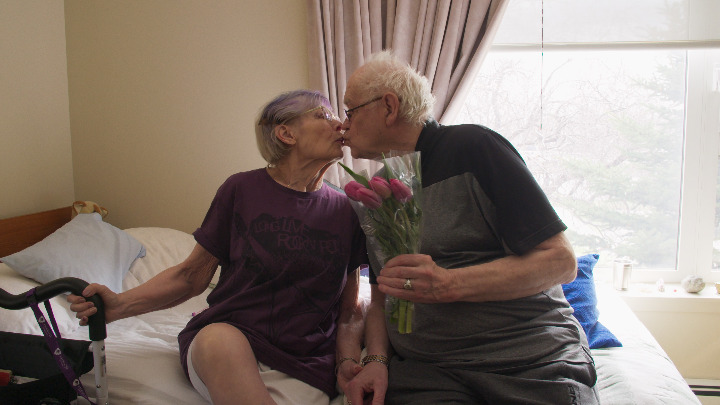Is there any sight quite as romantic as a sunset? Dominque Keller provides three portraits of enduring love in Love: The Last Chapter. This sweet slice of life doc observes a trio of relationships in a retirement home. Keller’s study of love in the golden years shows audiences what the vows to commit through sickness and health truly mean. It’s a touching and candid look at the lives of the elderly at a time when our seniors have been virtually abandoned during the pandemic.
Keller shot Love: The Last Chapter pre-pandemic, but the look inside the doors of the retirement home proves especially touching in the context of COVID. This film is a study in loneliness and connection, of agency and independence, and the challenges that come with the final days of one’s life. Observing three couples—Ruby and Victor, Jim and Diane, and George and Doreen—the film takes in various facets of retirement romance.
Jim and Dianne, for example, adapt to life in a shared community. They encounter the reality that they no longer eat according to their preferences and schedules. Getting care in the home means finishing lunch on time and sharing the space, as noted in one scene in which the staff hurries to clean up their trays while the couple lunches leisurely. Another humorous moment sees Dianne confront a new face—a seat stealer who may be trying to cozy up to her man. Their story illustrates how love finds its own path even late in life, adding a beginning to a tale largely comprised of endings.
George and Doreen, on the other hand, face the difficult reality of “until death do us part.” Doreen’s declining health likely means their 44-year marriage is nearing its end. They cherish the time they have left and invite Keller to witness their strength and vulnerability as they confront the inevitable.
Ruby and Victor, finally, face challenges of communication and commitment. Her health and mobility has declined and she understands that higher care is needed. Ruby wants her husband to join her, but Victor recognizes that moving to a different facility with more intensive treatment and supervision means surrendering remaining aspects of his agency prematurely. Ruby and Victor have serious and candid conversations about their future, and the film is very frank in its portrayal of the difficult decision they face: live separately according to their respective needs or move together and risk resentment over Victor’s loss of independence. Keller captures the work involved in maintaining a relationship over so many years, and the rewards of doing so, in a tender scene in which Victor visits Ruby late in the film. They negotiate their limited mobility, her walker and his chair, so that they can embrace and kiss. Despite the impersonal, somewhat sterile environment of the home, intimacy endures.
Keller captures these tender moments by immersing herself in the life of the retirement home and embedding herself within the structures and routines that govern her subjects’ lives. (Note the tag on one door that assigns the room to Dominique Keller.) By living with her subjects, Keller gains trust and access that allows the subjects to move unconscious of the camera, confronting their mortality while embracing their final days with their true loves. The Last Chapter is a touching glimpses into the lives of the elderly and an effective reminder that all people, no matter how young or old, deserve our respect, love, and attention.
Love: The Last Chapter premiered at DOXA 2021 and screens nationwide through May 16.














